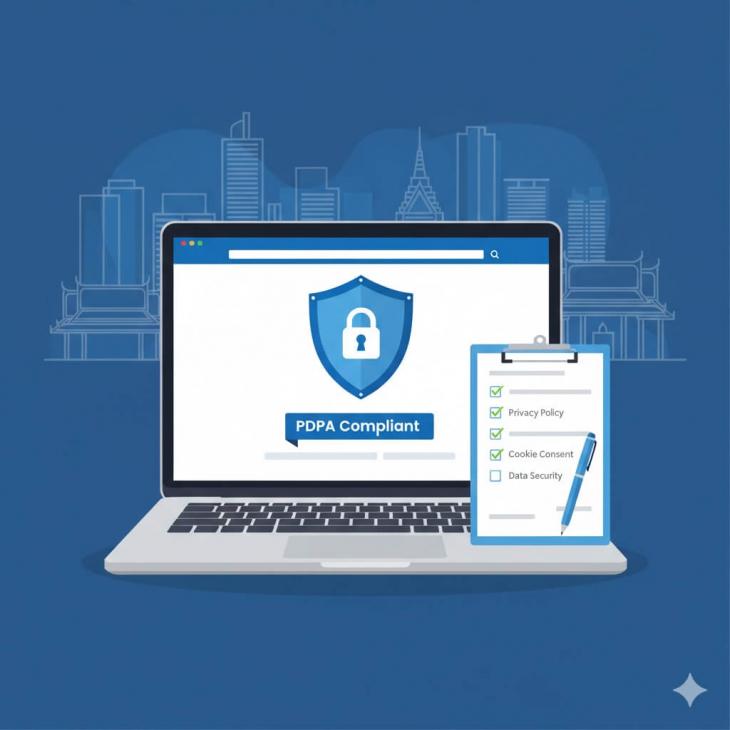Thailand's Personal Data Protection Act (PDPA) has fundamentally changed how businesses handle customer information. For any 'Expat Entrepreneur' running a website that targets users in Thailand, compliance is not optional. This article provides a straightforward checklist to help you audit your website's basic compliance.
What is the PDPA?
Think of the PDPA as Thailand's version of the EU's GDPR. It's a comprehensive law designed to give individuals control over their personal data. It dictates how businesses (Data Controllers) must collect, use, and protect any information that can identify a person, from a simple name and email to browsing habits collected by cookies.
Why PDPA Compliance Matters for Your Website
Non-compliance can lead to severe penalties, including hefty fines that can impact your business's bottom line. More importantly, in an age of digital awareness, a compliant website builds trust. It shows your customers that you respect their privacy, which is a powerful brand asset.
A 5-Minute PDPA Compliance Checklist for Your Website
Use these five steps to perform a quick audit of your site:
- Do You Have an Accessible Privacy Policy?
Your website must have a Privacy Policy that is easy to find (e.g., in the footer). This policy must be written in simple, clear language (Thai and/or English) and explain exactly what data you collect, why you collect it, how you protect it, and who you share it with. - Is Your Cookie Consent Banner Clear?
If your site uses any non-essential cookies (like for analytics or marketing), you must get active, explicit consent before loading them. A simple "This site uses cookies" banner is no longer enough. Users must be given a clear choice to accept or reject. - Are Your Contact Forms Compliant?
Any form on your site (contact, newsletter signup, etc.) must include a clear statement of consent. This usually involves an un-ticked checkbox stating that the user agrees to your terms and privacy policy. You cannot "pre-tick" this box. - Do You Have Basic Data Security (SSL)?
While PDPA covers more, the minimum standard for any website is an SSL certificate (https'//'). This encrypts data sent between the user's browser and your server. Handling personal data on an unencrypted (http://) site is a major compliance risk. - Can Users Exercise Their Rights?
Your Privacy Policy must explain how users can request to see, correct, or delete their personal data. You must have a process in place to handle these requests.
Beyond the Checklist: Ongoing Compliance
This checklist covers the basics, but true PDPA compliance is an ongoing process. For many businesses, especially those just starting out, integrating these rules from day one is crucial. This is often handled as part of the initial company foundation process.
For established companies, managing data requests and policy updates can be complex. This is where services like a legal corporate secretary can provide immense value, ensuring your business stays compliant as it grows.
Get Expert Help with PDPA
Navigating the technical and legal details of the PDPA can be daunting. Don't risk fines or customer distrust. The team at PS Law & Business specializes in helping foreign-owned businesses in Thailand understand and implement their PDPA obligations. Contact us for a clear, straightforward consultation.
FAQ
What are the fines for PDPA non-compliance?
Penalties can be severe. Administrative fines can reach up to 5 million THB, and there can also be criminal penalties and civil damages depending on the nature of the violation.
Does the PDPA apply to my small business?
Yes. The PDPA applies to almost all businesses that collect or process the personal data of individuals in Thailand, regardless of the business's size or where it is located. There are very few exemptions.
Do I need to appoint a Data Protection Officer (DPO)?
You are required to appoint a DPO if you are a large-scale data processor or if your business's core activities involve processing sensitive personal data. Our legal team can assess your business activities to determine if this is a requirement for you.




